The first game of the Stanley Cup Final between the West third-seeded Dallas Stars and the East second-seeded Tampa Bay Lightning went to the Stars. When the NHL announced their Return to Play plan, I was a little skeptical we would ever get to this point amidst a global pandemic, but after nearly two months and zero positive tests, it’s a joy to be writing about the Cup Final in September. Hats off to the NHL and players for their perseverance and dedication.
Related: Brad Marchand – Hall of Fame Worthy?
With a few extra days off, the Stars came out flying and scored first on a gritty forecheck and a nice finish from Joel Hanley. The Lightning tied it up in the first with a fluky goal off the skate of Yanni Gourde. After a back-and-forth first, the Stars were able to take the momentum in the second period and a 2-1 lead courtesy of Jamie Oleksiak, who put home his own rebound. Still in the second, they were able to push the lead to 3-1 thanks to Joel Kiviranta, the hero of the Game 7 win over the Colorado Avalanche.

After gaining a two-goal lead, the Stars retreated into a defensive shell taking just two shots in the final period to the Lightning’s 22. Luckily, one of the shots by the Stars was into an empty net leading to the 4-1 result. Here are a couple of interesting storylines in this Stanley Cup Final and some key takeaways from this game.
Offense Versus Defense
These two teams are a very interesting matchup with the Lighting being an offensive powerhouse and the Stars a defensive juggernaut. The Lightning was first in the NHL at 3.47 goals per game, while the Stars were second only to the Boston Bruins by allowing 2.52 goals per game in the regular season. In a simple sense, it is offense versus defense.
That was the regular season, in the playoffs, the Lightning has fallen to seventh in goals per game in the playoffs, while the Stars are merely 14th in goals allowed per game. The Lightning has climbed to third defensively from their seventh-place regular-season finish, but the Stars have made an even more unbelievable jump from 26th in goals per game in the regular season to fifth in the playoffs. It will be interesting to see which of these trends continues and which does not.
So far, the Stars seem to be able to generate offense against the Lightning, while not sacrificing too many chances in their own end. The high danger scoring chances for was 8-3 in favor of the Stars through two periods according to Natural Stat Trick. The three the Lightning generated in the third period were all on one shift and even though the Stars had zero in the final frame, it didn’t matter.
Russian Excellence in Net on Display
Since Nikolai Khabibulin became the first Russian goaltender to win the Stanley Cup in 2004 for the Lightning, Andrei Vasilevskiy will try to become both the second Russian and Tampa Bay goalie to do the same. Either way, since Vasilevskiy will face off against Anton Khudobin, the second Russian goalie to win the Cup will be crowned. 2020 marks the first Stanley Cup Final where each team started a Russian goalie.
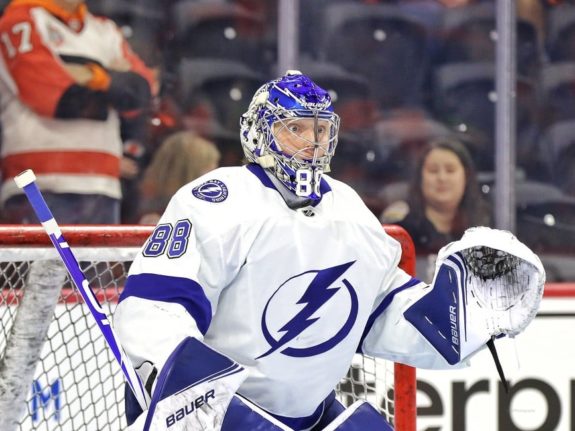
If for some reason Ben Bishop, who was unfit to play again, gets healthy and usurps Khudobin, or even more unlikely Vasilevskiy gets injured and Curtis McElhinney leads the Lightning to victory, then a second Russian to win will have to wait. It’s worth noting too that there were three Russian starting goalies in the Conference Finals with Semyon Varlamov starting most of the games for the New York Islanders and Robin Lehner, who is Swedish, was the only non-Russian starting for the Vegas Golden Knights.
The trend of elite Russian goalies seems to be continuing in the NHL with youngsters Igor Shesterkin and Ilya Samsonov debuting in somewhat spectacular fashion in 2019-20 for the New York Rangers and Washington Capitals respectively. Another Ilya, Sorokin, signed his entry-level contract with the Islanders in the offseason and will look to debut in 2020-21. There are whispers Sorokin is as good or better than Shesterkin. There is also Yaroslav Askarov, who is projected to be a top-10 pick in the 2020 NHL Entry Draft. It seems that a wave of extremely talented Russian netminders is coming.
No matter how you look at it, Vasilevskiy and Khudobin have been outstanding this playoff. If you just look at raw save percentage (SV%), Vasilevskiy is third with .931, while Khudobin is eighth at .920 for goalies with a minimum of six starts. Using the same cutoff, Vasilevskiy is second in goals-against average (GAA) with 1.82, while Khudobin is 10th at 2.62.
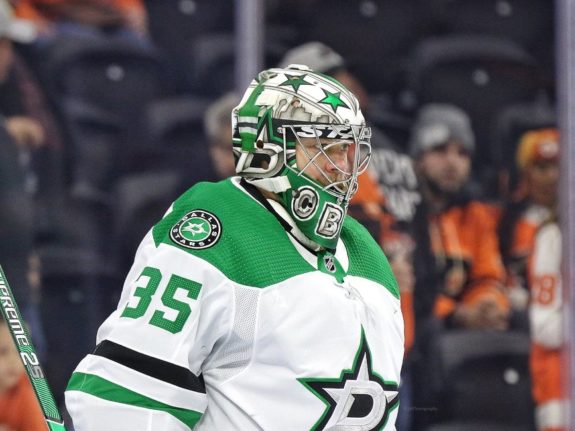
Varlamov is seventh and sixth on those same lists, but those numbers only tell half of the story. Looking at more advanced metrics from Evolving Hockey, according to goals saved above expected, Thatcher Demko is atop the list at 10.59, while Khudobin is second at 9.95 and Vasilevskiy is third at 8.89 goals saved above expected.
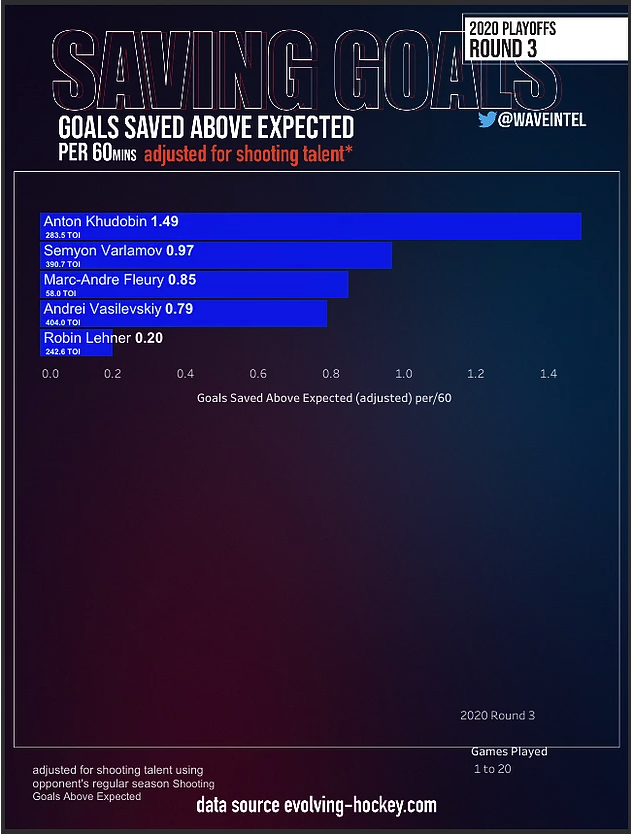
Expected goals metrics are useful, they look at many factors like shot distance from the net, shot type, shot angle, and others. The graphic above took that number and corrected it for the shooting talent using the opponent’s regular-season shooting goals above expected. This really shows how exceptional Khudobin was in the Western Conference Final. Staring down some of the best shooters in the league, he willed the Stars to victory.
In Game 1, Khudobin was as advertised as the only goal that beat him was a very unlucky ricochet. Good for Gourde to crash the net, but Khudobin put this rebound exactly where he needed to and didn’t get a favorable bounce.
Vasilevskiy certainly had some pretty good saves, however, according to Natural Stat Trick, the Stars only had 1.36 expected goals but he gave up three goals. His best save on Tyler Seguin was huge at the time, but he could not stop the second-period surge by the Stars.
So round one goes to Khudobin, who stopped all but one shot when the Lightning was expected to score 1.81. Vasilevskiy has shown he can play at an elite level and his Game 1 performance was not there. For the Stars to win, they will have to overcome a bounceback from the Vezina Trophy winner. On the other hand, if the Stars score first, they are a pretty difficult team to comeback against.
Physical Game
Both teams seem committed to laying the body on each other with the Stars recording 50 hits and the Lightning 56. Barclay Goodrow led the way for the Lightning with 12 hits and Blake Comeau and Oleksiak for the Stars tied at six. The forecheck directly led to the first goal by Dallas as Kiviranta gave Brayden Point a hard check that caught the attention of Zach Bogosian and put him out of position.

Roope Hintz collected the puck and found Hanley walking right down the slot. On the Lightning goal, Gourde was driving the net hard, which led to the lucky bounce. I would expect the physicality to continue and perhaps the Stars have the advantage there having had a few extra days of rest.
Unlikely Goal Scorers
The first two goals of the game were scored by players who were never drafted. Hanley’s goal was the first of his NHL career. He is the 10th player in league history to score his first goal during the Stanley Cup Final. After spending much of his career in the AHL, he has found a home on the Stars’ third pairing with Taylor Fedun unfit to play. Surprisingly, Hanley has a higher individual Corsi for per 60 minutes than Andrej Sekera, according to Evolving Hockey.
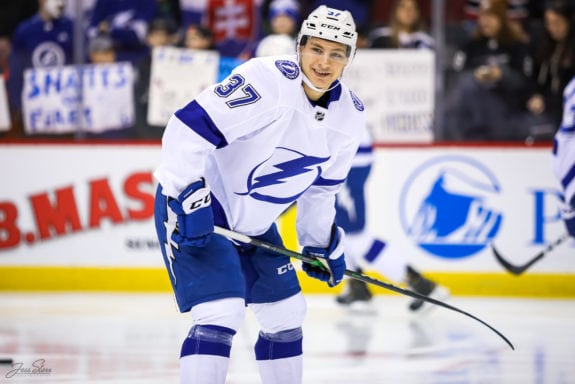
The second goal of the game by Gourde was not the first of his career, season, or playoff even. But it is still impressive that the 28-year-old native of Saint-Narcisse, Quebec has not only made it to the NHL but finds himself on one of the best play driving lines in the playoffs. Gourde signed a six-year contract worth $5.16 million on November 2nd, 2018. The Lightning showing their commitment to the undrafted forward has paid off to the tune of six goals and seven assists in the 19 games he has played this postseason.
The Battle for the Conn Smythe
The Conn Smythe Trophy is awarded to the most valuable player of the Stanley Cup Playoffs. It almost always goes to a player on the team that wins. Only five players have ever won the award on the losing team; Jean-Sebastien Giguere (Mighty Ducks of Anaheim, 2003), Ron Hextall (Philadelphia Flyers, 1987), Reggie Leach (Flyers, 1976), Glenn Hall (St. Louis Blues, 1968), and Roger Crozier (Detroit Red Wings, 1966).
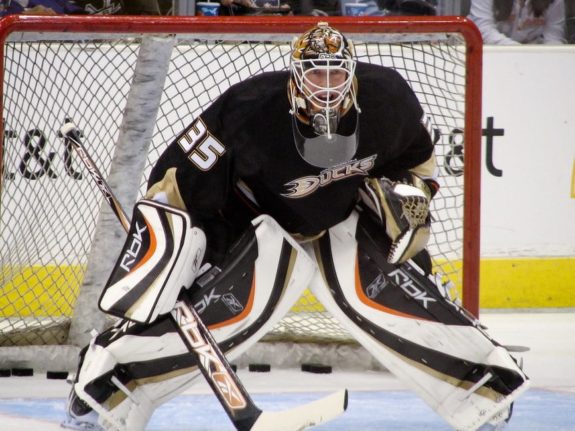
I doubt a player on the losing team wins it this year as there are several deserving players on each side, but none that stands head and shoulders above. Except for maybe Khudobin. There is a lot of hockey to be played, but if Khudobin continues his outrageous stretch of excellent hockey, there is an outside chance he wins it either way.
Related: Top 3 All-Time Stars Goalies
If I had a vote though, I think I might cast it for Miro Heiskanen. The second-year defenseman has been truly outstanding. His defensive acumen has always been good, but his scoring throughout his first two seasons was at .45 points per game. Not bad at all, but in the 2020 playoffs, he has elevated that to 1.05 points per game. In addition, Heiskanen has played against some of the toughest competition and has yet to take a penalty.
You can add Nikita Kucherov and Point who sit first and second in NHL playoff scoring to that list. Along with Ondrej Palat, who has been having himself a great playoff and the excellent third line of Gourde, Goodrow, and Coleman as well. Night in and night out, Heiskanen not only shuts down the best of the best, but he helps drive play in the other direction. There is no better defense than being on the offensive.
What is Next?
Now that the Lightning sees exactly what they are up against, I expect they will have a better effort in Game 2. Though they badly outshot the Stars 36-20 and had more scoring chances, they were chasing the game the whole night. If the Lightning can get the lead, it will be a whole different game. If the Stars score first again in Game 2, the frustration of the Stars’ suffocating defense may cause the Lightning to start to breakdown, much like the Vegas Golden Knights did and this series could be over in a hurry.